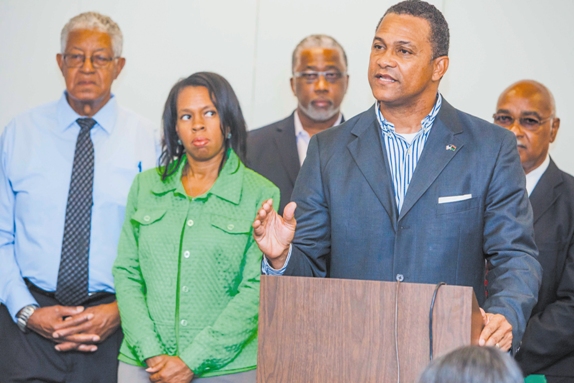DES director speaks to Congress about low-income safety net
Clarence Carter, executive director of the Department of Economic Security in Arizona, spoke in Washington today, hoping to improve the safety net system for low income families.
Marijuana dispensaries get deadline reprieve
A Maricopa County Superior Court judge ruled today that given the obstacles encountered by medical marijuana dispensaries since 98 licenses were awarded in August 2013, the requirement to open within one year is unreasonable and must be revamped.
Horne threatens to sue federal commission over voter registration forms
Following the guidance of a U.S. Supreme Court justice, Attorney General Tom Horne has threatened to sue an effectively non-existent federal commission if it doesn’t put Arizona’s requirement of proof-of-citizenship on federal voter registration forms.
Horne is giving the U.S. Election Assistance Commission until Aug. 19 to act, stating in a July 26 letter to the commission’s acting e[...]
Commerce Authority committee to decide Watson bonus
The Arizona Commerce Authority’s compensation committee will decide on Monday how much of a bonus CEO Sandra Watson will receive for her first year at the agency’s helm.
Dissenters question Arizona’s stand-your-ground law, but law officers caution against changes
Like similar laws around the country, Arizona’s stand-your-ground law has been in the spotlight since a Florida jury found George Zimmerman not guilty in the shooting death of Trayvon Martin.
DuVal touts endorsement of convicted Navajo chairman
A Navajo Nation chairman who served time in federal prison for fraud and racketeering was among more than a dozen endorsements by tribal leaders released by Democratic gubernatorial hopeful Fred DuVal.
Costs soar for new Common Core achievement test
The cost per student for the new test to measure progress under Common Core is nearly 50 per cent more than the AIMS test, causing sticker shock among some lawmakers and advocates for the learning standards.
Ducey files exploratory committee for governor’s race
State Treasurer Doug Ducey filed an exploratory committee for the 2014 governor’s race, taking the first steps toward his widely expected candidacy for the state’s highest office.
Clean Elections chooses Collins as new executive director
Thomas Collins, the attorney who has provided legal advice to the Citizens Clean Elections Commission for the past two and a half years, will take over the agency as its new executive director.
Lawsuit challenges proposed $10 million gift to behavioral health contractor
Magellan Health Services has a new ally in its battle over a multibillion-dollar contract for behavioral health services in Maricopa County.
Commission to take neutral stance in lawsuit over judicial appointments
The Commission on Appellate Court Appointments voted unanimously Monday to be a neutral defendant in a lawsuit alleging a new law that expands the pool of judicial nominees is unconstitutional.
Corporation Commission asks for public’s views on electricity deregulation
The Arizona Corporation Commission has asked the public to weigh in on electricity deregulation, which would break up the state’s system of “regulated monopoly” under which a handful of public utility companies are in charge of generating and distributing power to homes and industries.















